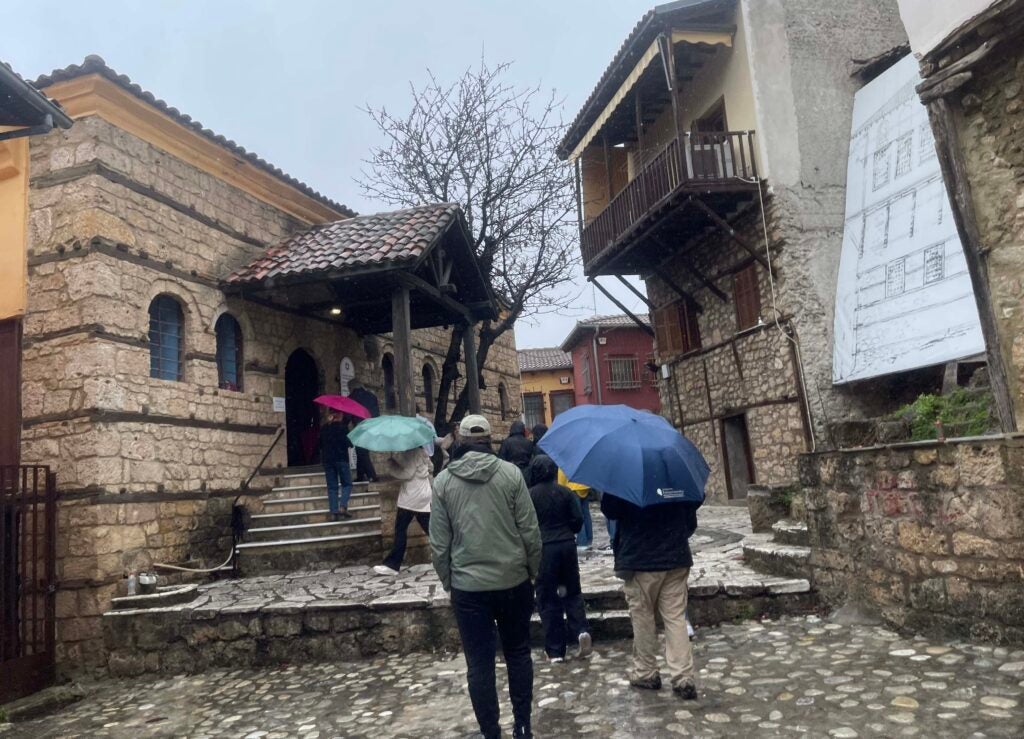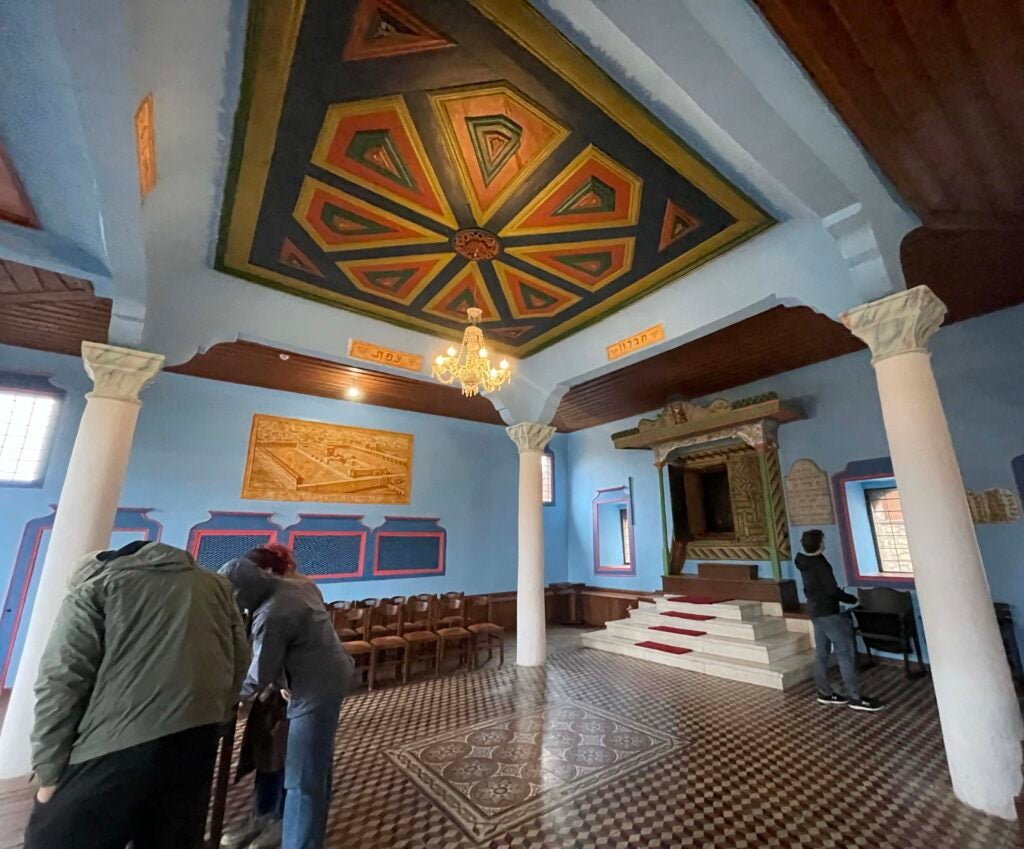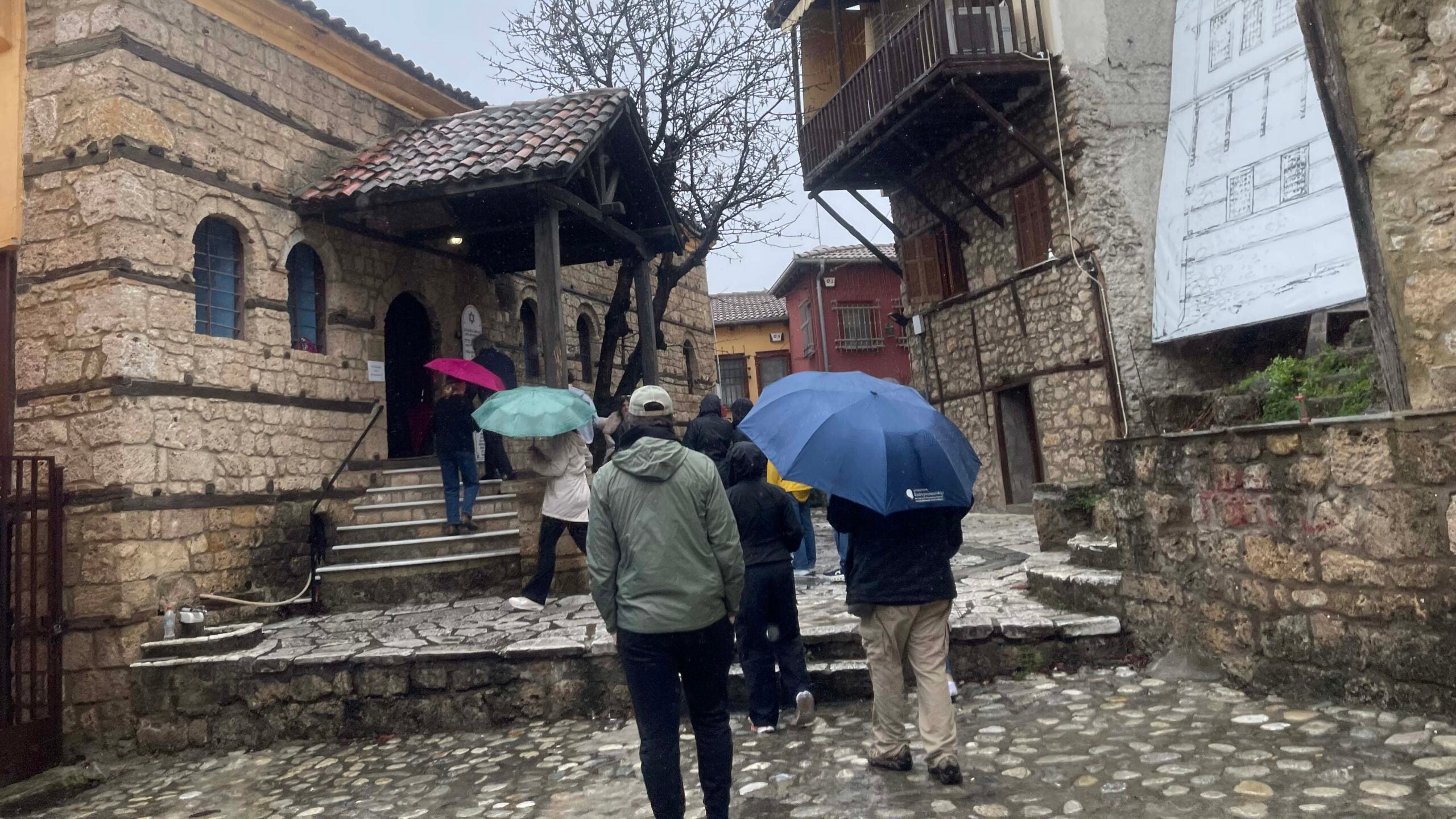Impactful Immersion: Georgetown’s Magis Trip to Greece
Reading St. Paul in Greece
By Jennon Bell Hoffman

Heading toward the synagogue located in the Jewish Quarter of Barbouta, Veria, Greece. Photo by Matty Liebman (C’24 )
Greece, with its ancient ruins, stunning landscapes, and rich history, has long captivated the imagination of travelers. Yet, beyond the tourist brochures lies a deeper, more profound experience waiting to be uncovered. For sophomore Jack Willis (SFS’26), his 10-day journey, led by Professor Ori Z. Soltes and Fr. Ron Anton, S.J., as part of the Magis Immersion Seminar program, brought reflections and revelations through the letters of St. Paul and the heart of Greece.
The Magis Immersion Seminar course, titled “Reading St. Paul in Greece,” was taught by Professor Soltes and centered on Paul of Tarsus’ missionary activity in the Eastern Roman Empire with an emphasis on Greece. As initially a Judaean sect in rural Judaea/Palestine, Christianity spread and developed in the late first century in the cities where Paul and his associates established distinct communities that followed Jesus Christ. Growing out of mainstream Judaism, Paul’s letters to these communities helped support and strengthen their discipleship, amidst the background of religious persecution and political and economic tumult. His letters helped support the communities and spread the Gospel of Christ across the Greco-Roman environs.

The front entrance to the synagogue. It is said to be of interest to Jews and Christians because it is believed that the apostle Paul preached there in 50 AD. Photo by Matty Liebman (C’24 )
The itinerary was jam-packed with visits to churches, tours of holy sites and ancient ruins, small villages and large cities, all designed to be far from the tourists and stereotypes. For Jack, having such an expansive itinerary deliberately and carefully planned made the experience invaluable to him.
“The fact that we had [Ioanna Kopsiafti] an expert on Greece planning the entire trip took that burden off the students and allowed us to just be in the moment, not worrying about the logistics, safety, transportation, etc., made for such an immersive experience,” says Jack. “I think the itinerary really prioritized going beyond what you might think of when you first think of Greece. It set the stage for a big theme of the trip, which is that there’s so much beauty and interesting things to be found in the unexpected.”
By going off the beaten path, Jack says the students found hidden gems and profound insights at every turn, resulting in a rich experience of academic exploration, spiritual reflection, and cultural immersion. Starting in Greece’s second-largest city, Thessaloniki, the group first focused on the Jewish experience in Greece, striving to understand how their persecution helped shape the worldview of St. Paul at that time, and how it influenced what he wrote to those communities.
“We were simultaneously able to talk about the themes of hope and love in the Pauline letters and the heavier reality that many people encountered in the same context, all while having great meals, and building lasting friendships,” says Jack. “Experiencing Greece in the most authentic way was such a cool way to do the trip.”
The trip covered large swaths of Greece’s mainland, from Thessaloniki in the north to Philippi, near the Turkish border in the east, and Corinth and Athens in the south, stopping at sites of St. Paul’s letters and taking in the historical and spiritual context of St. Paul’s life at that time. The total immersion in a modern culture with deep ancient roots was an experience that Jack says enriched their understanding of the Pauline letters in the context of ancient and modern Greece.

Interior view of the synagogue, Veria, Greece. Photo by Matty Liebman (C’24 )
“We added an unplanned stop at a town called Veria because our professors had read about a synagogue there that is pretty credibly dated back to the time of St. Paul and local legend says that he spoke there. That town, like Thessaloniki, had a thriving Jewish community that was pretty much decimated in World War II. There’s only one Jewish person left in the entire town. But our tour guide had a friend who is a Christian woman, Greek Orthodox, who spent her own time and money to get this synagogue, which was in disrepair, back into shape,” says Jack. “Having access to a Greek person [doing this work] allowed us to think about interreligious dialogue and what it means to love your neighbor and support one another, which are themes in the Pauline letters that come across in this way that’s so unique, and so meaningful.”
In addition to the historic sites and reimagining St. Paul’s letters in real-time, it was the unexpected encounters and moments of connection that left the most lasting impressions on Jack. Whether sharing stories with locals in a quaint village or engaging in silent reflection amidst the Meteora ruins, the trip fostered a sense of kinship and understanding that reminded Jack of his experiences back on the Hilltop.
“At Georgetown, we prioritize interreligious dialogue and inter-religiosity in general and we walked the walk [on this trip], being able to see that even in ancient times when these two faiths are presented as being in contrast with one another, how true is that really?” says Jack. “From a theological perspective, I think we just took so much away from experiences like that; they really made the trip what it was—these small moments and important places, with people that we’ve come to know so well. It presented the letters of Paul in Greece in a way that I never imagined would have been possible otherwise.”
By attending a Magis Immersion Seminar, Jack knew his interest in philosophy and history would also have a place alongside his international politics studies, a feature of Georgetown that he is deeply grateful for.
“One of the main reasons that I decided to attend Georgetown was because I knew I wanted to pursue international experiences. Whether it’s through the Magis Seminar, this one-of-a-kind trip that makes you think in an entirely new way and make a great group of friends and connections with professors and chaplains, or pursuing opportunities that offer the same kind of immersion,” says Jack, “We’re at a unique place in our lives to have these once-in-a-lifetime experiences and Georgetown has offered so many amazing opportunities that have allowed me to go abroad and expand my perspective. I’m so grateful for that.”
Jack Willis (SFS’26) is studying International Politics.
Professor Ori Z. Soltes teaches theology, art history, philosophy, and political history at Georgetown University.
Fr. Ron Anton, S.J., is the superior for the Georgetown Jesuit Community.
Ioanna Kopsiaft is a Greek art historian and tour guide.
Jennon Bell Hoffmann is a freelance writer and editor living in Chicago.
